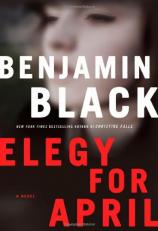Elegy for April
Review
Elegy for April
It’s no secret that Benjamin Black is the mystery-writing alter ego of John Banville, which is a way of distinguishing Banville’s mainstream work from his genre fiction. He brings the same beauty of craftsmanship and appreciation of language to both branches of his career, though he might deny it. The quiet sense of humor that intermittently informs his work makes one wonder if he is just putting his readers on when he indirectly disparages his mystery novels. In any event, ELEGY FOR APRIL, the fourth of his Black novels and the third featuring the enigmatic Quirke, does not suffer from lack of attention or anything else for that matter. It is wonderful in every conceivable way.
The Quirke novels are set in the Dublin, Ireland of the 1950s. The brilliantly named Quirke, a pathologist whose erratic behavior belies a keen intelligence, is at the beginning of ELEGY FOR APRIL, newly released from an alcoholic rehabilitation facility. His reaction to sobriety is telling and two-fold: he almost immediately buys an expensive automobile --- one of only three in existence --- despite the fact that he has no insurance or driver’s license, and he begins testing the waters of his tolerance for alcoholic beverages (wine, it seems, does not count). Phoebe Griffin, his quietly but deeply troubled daughter, wanders into this slowly building maelstrom, seeking his assistance. It seems that one of Phoebe’s friends has vanished, and Phoebe wants Quirke to find her.
April Latimer, a new doctor at a local hospital, is what was referred to in the mid-20th century as a libertine, and her disappearance is not inconsistent with her behavior, which is regarded as wild and unpredictable. April’s prominent and influential family finds her disappearance to be of little or no consequence, and her absence is greeted by them with more a sense of relief than worry or dismay. This is true even as Quirke brings his erstwhile acquaintance, Detective Inspector Hackett, into the fray. When Hackett discovers that April’s absence is possibly due to foul play, the family grows even more resentful and instructs Quirke to stop his de facto investigation. He does not lack for suspects, particularly among the small group of friends with whom April associated --- at least two have potential motive to have done her harm. Quirke keeps pressing but with mixed results.
Black combines a quietly intriguing yet mesmerizing plot with an addicting character study that focuses on inflammatory relationships and smoldering emotions, and the effect of power --- both official and otherwise --- on both. By the end of the book, one story ends while one or more begin. Perhaps.
ELEGY FOR APRIL is one of those worthy books that begs to be read in one sitting. It defies the conventional wisdom that a modern novel must begin with an explosive event; instead, this one builds slowly to a conclusion that is emotionally charged yet subdued by today’s standards. It is no less riveting, however, for the understatement of its action. One feels the ground shifting under Dublin and Quirke on every page, and can be left with the certainty that the next Quirke book cannot come fast enough.
Reviewed by Joe Hartlaub on January 21, 2011





